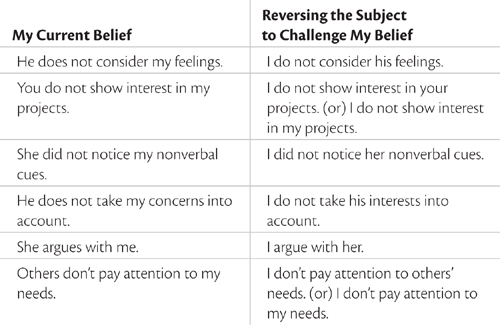CHAPTER FOUR
But I Liked My Real Job!
What you manage in business is people.
—Harold Geneen
I did not sign up for this
Not in my plan, not on my list
Never wanted to be in charge of you
And now my work is never through…
Unless you select the route of pure neglect, the demands of managing can make your head spin. A heap of tasks follows you around like a storm cloud in spring, making even your most Herculean efforts seem to fall short. You may never catch up. Drowning in paper, people, processes.
Ts, I understand what you’re thinking. Fs, I feel your pain.
Even if managing wasn’t on your radar when launching a career, you really can learn to accept and even enjoy the part of job called “being a manager.”
 &*%$@# Overwhelmed
&*%$@# Overwhelmed
I hear you… and I appreciate your directness. Let’s dish.
Anne Lamott wrote the bestseller Bird by Bird: Some Instructions on Writing and Life. Embedded in the title is a universal lesson that Anne explains in her book. She tells it like this:
Thirty years ago my older brother, who was ten years old at the time, was trying to get a report on birds written that he’d had three months to write, which was due the next day. We were out at our family cabin in Bolinas, and he was at the kitchen table close to tears, surrounded by binder paper and pencils and unopened books on birds, immobilized by the hugeness of the task ahead. Then my father sat down beside him, put his arm around my brother’s shoulder, and said, “Bird by bird, buddy. Just take it bird by bird.”3
Ever since I first read Bird by Bird, years ago, this advice has pulled me through difficult times. When you are overwhelmed with all your duties, remember Anne’s dad’s advice. Bird by bird.
Thanks, Anne… and hats off to your procrastinating brother and smart dad.
Ch-Ch-Ch-Ch-Changes
There’s another reason promotion to manager—or to a more senior level of management—is tough. It’s because change of any kind is difficult. Even so-called positive change. Presumably we are supposed to be happy about “good” change. So we feel guilty, on top of everything else, for having a negative reaction to positive change.
Change, by definition, means a departure from the status quo. Positive change—a promotion, a partnership, a bigger sales territory, a new home—still signifies a loss, letting go of the familiar. What we know and are comfortable with is gone. A wise entrepreneur I know describes times of successful transition as “being positively challenged.”
So cut yourself some slack. Part of the reason you miss your “real” (aka previous) job is because it was what you knew. Now you’re playing by new rules, with new expectations and new demands. Easier on paper than in practice. It’s okay, though. Believe it or not, you’ll get the hang of it.
I Gotta Be Me!
Here’s a floatie to grab hold of when swirling into the riptide of managing. The only person you can be really well is yourself. Recall the Royal Rule presented in chapter 2: Be you.
Many of us forget this minor detail.
Remembering that you are, first and foremost, yourself is the first step toward being a successful (T!), happy (F!) manager.
The only way you can aspire to managerial
greatness is by channeling yourself.
As a senior executive in the tech industry wisely advised, “Don’t try to be someone you’re not. Managers come in all shapes and sizes, and the more you stay true to who you are, the harder people will work for you.”
Here’s the corollary to being yourself. Ready for this heady piece of reality?
You are not anyone else.
Take a moment to let this reality-altering whopper sink in. The ramifications are mind-boggling. You no longer need to decide for anyone else what they think or feel, the motivation behind other people’s behavior, the rightness or wrongness of their decisions, the validity of their actions, or the justification for their inactions.
What a relief! Wipes clean a major chunk of the items to analyze in your overburdened managerial mind. What are you going to do with all your spare time?
I’ve just the thing to fill it. As it turns out, there are three rather pressing items over which you have complete and utter control… and responsibility. In fact, these are the only items you control. You might want to write them down.
Your sole areas of direct responsibility are
your thoughts, your words, and your actions.
Narrows things down, doesn’t it? Ponder this. Go ahead; think of a single additional item over which you have direct control. Nada.
Getting down to it, you really need to direct your attention to the person behind the curtain. The one moving all those gears and pulleys, with the handy smoke and mirrors available on an as-needed basis. That would be you. It is tempting (and easy) to direct attention outside ourselves. Doing so lets you off the hook and results in a whole lot of nothing. As the owner of a financial services firm quipped, “Just give up on the idea you can control others.”
Although don’t managers have to, well, manage other people? Isn’t that what this is all about? Let’s recall from chapter 1 our handy-dandy definition of managing:
Managing is the high-wire act of balancing
useful guidance and getting out of the way.
Getting out of the way, once we get the hang of it, is easy. It means stepping aside and letting others do what they’re there to do, rather than suffocating them with our interference and brilliant plans. Useful guidance is providing structure, sharing expectations, and being available to contribute to others’ success.
None of that involves efforts to control anyone else’s attitude, approach, or personality. We are too busy monitoring and consciously choosing our own thoughts, words, and actions to waste our time doing the impossible—being in charge of other people’s inner worlds. Yet, by using our words and actions well, we can influence the responses and behaviors of others. As an executive vice president of a public relations firm put it, “The only way to get people to do what you want is to get them to want to do it. I have to give you something you want, like appreciation, recognition, importance.”
Testing and Revising Beliefs
This skill can entirely change your viewpoint and subsequent relationships. Think of beliefs you hold to be true about others. Next, rewrite the sentence, inverting the subject and object, as demonstrated in the following chart. Practice saying the revised sentence aloud and ask yourself about the likelihood that the new sentence is likely to be as true or truer than the original sentence. Try these on for size:

Believing we know what is in someone else’s mind presupposes supernatural powers. Presumably you know what other people think! That means you’re a mind reader, with knowledge of others’ inner thoughts. If that’s the case, you really owe it to your country to work for their intelligence agency.
Otherwise, it’s worthwhile to acknowledge that the rest of us never really know what is in someone else’s head.
Nearly always, when we attribute a belief or opinion
to someone else it means we have it ourselves.
Take My Job, Please!

What if you really, really do yearn for your previous, nonmanagerial position?
Fredrico was a 35-year-old attorney working for a large U.S. agency. Within a year of receiving a promotion to a management position, he demoted himself.
You read that correctly; put the reading glasses away.
Why would a young professional in the midst of building a career and a personal life go so far as to reverse a promotion? You get one guess. Think context.
In Fredrico’s promoted role he got to manage a herd of other attorneys in addition to handling his own, scaled-back legal work. Fight the urge to spout off a slew of lawyer jokes (though if you have a good one, send it to me).
Fredrico’s decision didn’t have to do with attorneys but with managing. He preferred to stall—perhaps arrest—his career trajectory to relieve himself of management responsibilities. He decided he would be happier, more fulfilled, and less stressed if he went back to being responsible only for himself.
Several years later Fredrico remained pleased with his choice. He enjoyed more autonomy, more flexibility, and shorter hours than his peers who took and kept comparable promotions.
Self-demotion is not an unheard-of phenomenon. The key is to be clear about your aspirations and goals. Fredrico’s choice ended up being wise for him, if unconventional. Upon accepting a managerial position, you are making a decision to assume significant additional responsibilities and challenges.
There is nothing wrong with committing to a purely technical, nonmanagement career. As one CEO in sales and business development put it, “If you don’t believe you can handle the added responsibility of being a manager—or just don’t want to—don’t take the job. I have seen great salespeople promoted to managers only to see them fail. I have also seen the opposite to be true. Sometimes, however, you are great at sales and should stay there.”
In the case of Fredrico, choosing to decline a promotion to management required the certitude and courage to be true to himself.
Let’s say you don’t want to self-demote, yet hope on some less-than-rational level that you can hold a management position without having to actually, you know, manage. Maybe being a solid team player is good enough, you’ll only manage self-starters, or you’ll just assume the less-is-more management style.
I’ve got news for you: Management is not an aberration that interferes with your job. Take that belief, write it down, crumple it up, and toss it into the garbage (or, uh, recycling) bin in your workspace. Now do the responsible thing and get up, pick it up off the floor where it actually landed, and place it in the bin.
Hello, logotherapy. Everything tastes better with meaning.
Logotherapy
Victor Frankl, psychotherapist, developed logotherapy as the culmination of his personal and professional experience. Logotherapy is founded on the premise that meaning makes life purposeful. Frankl maintained that responsibility and meaning are linked. He explains in his book Man’s Search for Meaning that the search to find meaning in one’s life is a human being’s primary motivational force.
Meaning can come from any number of sources and is both specific and unique. Regardless of how you define meaning, it is darn important. Frankl cites a Johns Hopkins University study on this topic. Researchers surveyed eight thousand students at forty-eight colleges as part of a two-year study sponsored by the National Institute of Mental Health. When asked what they considered “very important,” only 16 percent gave highest marks to “Making a lot of money,” whereas 78 percent listed as their primary goal “Finding purpose and meaning in my life.”4
Money does not, apparently, buy meaning—or happiness.
According to Frankl, independent of circumstance, one can choose a life of despair, anger, hopelessness, and hostility or a life rich with meaning and purpose springing from a larger sense of purpose. Frankl’s firsthand experience surviving in concentration camps enabled him to witness and experience, in the lowest imaginable human circumstance, that choices can be correlated with survival itself. He explained that in concentration camps all circumstances conspire to make prisoners lose hold of meaning. All familiar goals are taken away. Frankl called what remained “the last of human freedoms”: the ability to choose one’s attitude in a given set of circumstances.
Frankl observed average people, thrown into inexplicably inhuman situations, who proved to have a capacity to transcend despicable circumstance and discover guiding truths. Rising above an outward hell, some prisoners were able to lift themselves out of despair by creating purpose through assisting others.
On a more accessible level, identifying a unique purpose and contribution on the job can give you and those around you, the lift you need to thrive. The greater your responsibility (as you ascend the management ranks), the greater your potential for meaning.
There is a correlation between excelling and investing one’s work with meaning. Those who go above and beyond in their work also report the highest levels of workplace satisfaction. The more energy invested, the greater the exhilaration of putting skills to maximum use.
The Impostor Phenomenon

Many managers harbor a secret, doomed sense of being fraudulent—if others only knew how incompetent and over their heads they really are!
The mid-1980s yielded a gem of a book entitled The Impostor Phenomenon,5 which attracted a much-deserved cult following. The gist is that what many of us present externally is worlds apart from how we feel inside.
The book opens with a vignette of a successful businessperson working a room. Step inside the same person’s mind, however, and an entirely different interpretation of reality is revealed.
The book’s platform is that many seemingly successful leaders secretly believe themselves to be impostors and that if the rest of us realized what ill-equipped fakers they really are, their entire facade would crumble apart.
This phenomenon is alive and kickin’ in the twenty-first century. Plenty of marvelously qualified people view themselves as alarmingly inept at navigating the business worlds in which they find themselves. The higher they rise, the greater the sneaking suspicion that this has all been a big mistake, that they somehow lucked into this leadership role.
Amplifying this belief is the fact that the higher one climbs the corporate ladder, the less likely senior executives are to pursue professional development opportunities.
I see this link reflected in my leadership development seminars. When I facilitate a program for a crowd of up-and-comers, they typically soak in knowledge like luminous sponges on the Great Barrier Reef.
Seasoned pros, on the other hand? Except for a rare breed, most attend professional development opportunities only under duress, convinced they already know it all.
Becoming a general counsel, partner, C-suite resident, or achieving some other form of “success” means you have achieved technical success in your field. It does not necessarily correlate with being a talented, knowledgeable, or inspirational leader. Being a lifelong learner is a practical way to combat the perception that you are an imposter. Not to mention improving your management skills. There, I mentioned it.
Prove It
What is the best guarantee you won’t be considered fraudulent? That your true intentions will be believed? A few years back, I found the following Lewis Cass quote taped to the front of a client’s door:
People may doubt what you say, but they will believe what you do.
Rambling on about your commitment to the team won’t convince anyone you care. Chipping in to help with a project because you want them to shine? You don’t need to say a word and they know where you stand.
Sample Example
Trashy Leadership

Monica had been preparing a presentation for weeks. Two days before the event, she put the finishing touches on a poster-sized storyboard.
And then… ! The night before the big conference Monica couldn’t find her storyboard anywhere. It seemed to have vanished into the fourth dimension. Slowly the realization hit her that the maintenance crew might have tossed out her carefully crafted presentation, mistaking it for garbage. Nearing panic, she poured out her suspicions to Drew, her supervisor. He excused himself from the room.
Monica didn’t know where he had disappeared to until she glanced out a window overlooking the back of the building. There was Drew in the Dumpster, sleeves rolled up, searching for Monica’s presentation poster. She called over her colleagues, who were also working late to prepare for the next day.
Drew found it. He thought what he did was no big deal. He expected 100 percent from his department and always gave at least that much himself. He loved his job and was known to be authentic in all his dealings. He led quietly, with no observable ego interference.
Drew returned upstairs to a team that would run a hundred miles for him in the rain.
Expanding Your Reach
Self-aware human beings make the best managers. Skeptical? Isn’t putting together a solid structure and smart team enough? No. Don’t believe me? Let’s flip it. Recall a terrible manager you’ve come across in your trials and travails traversing the globe. My wild guess is he had the self-awareness of a barnacle.
So the first step is looking in the mirror, knowing who you are. That’s not quite enough, however. Ready for part two?

For the second step, we put the mirror aside. Don’t worry; your hair looks fine.
Fortified with strong self-knowledge, you are now ready to leverage your strengths to meet other people where they are. I call this flexing, an exceptionally valuable, versatile management skill. Don’t expect others to speak your language, understand your motives, or change to suit your whims. Most people just aren’t that skilled. It is up to you.
Being flexible in how you relate to and motivate others does not mean compromising fairness. Within the context of holding everyone to the same standards of performance and conduct, you can adapt your language, feedback techniques, and modes of reinforcement.
Starting with chapter 5, a wrap-up “Flex” and a P.S. will conclude each chapter. Just like an amuse-bouche, except those start a meal and often fit on a spoon.

